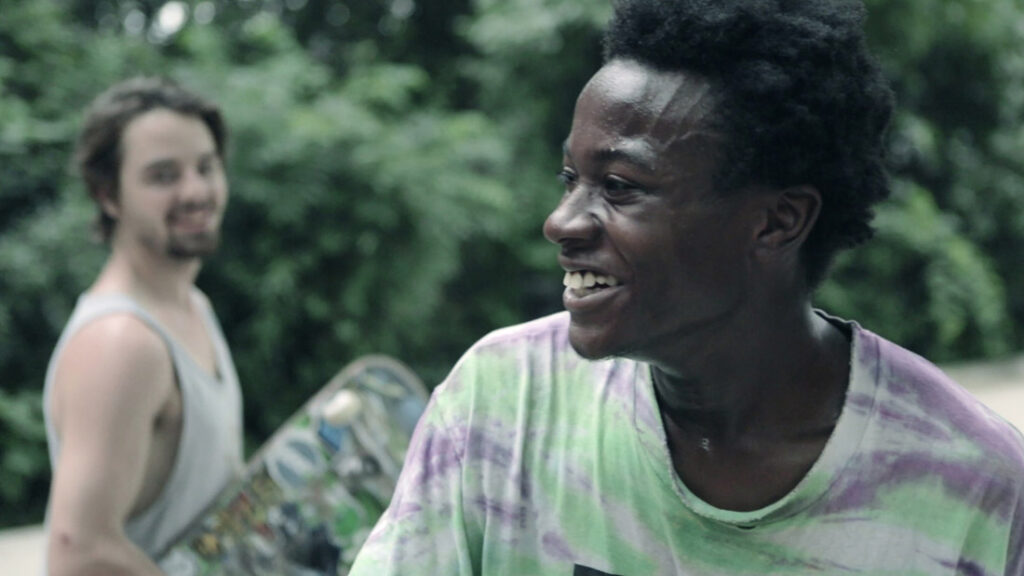No group of artists better embodies Roger Ebert’s belief that the best cinema serves as an empathy machine as the good people of Kartemquin Films, and they affirmed that fact at Sundance 2018 with a pair of projects that take us into worlds we don’t often see on film and almost miraculously convey both the specificity of their stories and their universality at the same time.
Premiering in U.S. Documentary Competition was Bing Liu’s deeply personal “Minding the Gap,” about Liu and his two best friends, Zack and Keire. At first, a film about a young man going home to hang with his skateboarding buddies in Rockford, Illinois, may not seem like enough skeleton on which to hang a film, but Liu not only has an excellent eye but deeper ambitions. He weaves a story of three young men who turned to the skateboarding community, and each other, to avoid troubled families, and then he takes that idea a step further, questioning masculine roles in the ‘10s. Lines like “Skateboarding is more of a family than my family” could be spoken by any number of young men around the country, but Liu is willing to gently probe his own background and that of his friends to not only ask why they needed another family but what this means for their futures as potential fathers.
As Liu’s film unfolds, Zack becomes a father himself, Keire deals with trauma over losing his patriarch, and Bing is brave enough to interview his own mother about the abuse in their household when he was growing up. These are people with dark pasts, and one can feel Liu’s worry that this will make for dark futures as well. How do we break these patterns if we can’t even talk about them? There’s also something fascinating that I don’t think a film has considered before in that these are young people who are constantly flirting with bone-breaking danger. They live dangerous lives on skateboards, and yet they always reaffirm their love for it. Much like an abusive parent, it hurts you but you still love it.
There’s also something deeply resonant in the way Liu captures a time when young men are both child and adult, especially if they have open wounds from their difficult youth that may have stunted their maturity. And what do we do when an abused child becomes an abuser himself? One of the men in the film develops a dark side, at least according to his baby’s mother, and you can feel Liu’s reticence to confront him about it. Without underlining or overly highlighting its themes, “Minding the Gap” is a film about modern millennial masculinity in a way that breaks the stereotypes and asks us to confront not only cycles of abuse but how they shape both the memories we want to suppress and the friendships we never want to forget at the same time.

Liu’s film would be enough for most companies at a fest like Sundance, but Kartemquin also appeared in today’s Indie Episodic program, premiering five episodes of the ambitious “America to Me,” a ten-hour series that captures a year at the racially diverse Oak Park and River Forest High School. Directed by Steve James, “America to Me” has a different energy that most films about young life in the ‘10s, largely because the lengthy running time allows the production to breathe in ways that most documentary films don’t, but also because of James’ deep humanism, one that challenges preconceptions and conveys a deep love for his fellow man.
OPRF isn’t your ordinary high school. Not only is it gigantic (3,200 students) but it draws from a incredibly diverse array of demographics. It pulls from incredibly rich, mostly white neighborhoods in Oak Park, and also abuts the dangerous west side of Chicago. How on Earth do you teach this broad a spectrum of children? How do you recognize the diversity of their background in one syllabus? To their credit, several of the teachers and administrators willing to speak on camera openly recognize the difficulty of their situation, and the show chronicles a year in which concern over underperforming minority students was front and center. A board member says bluntly, “We’re preparing our black students less well than the white students,” and a conference is featured in which the head of the Pacific Educational Group says even more frankly, “We sit in a country that really hasn’t decided yet that it wants students of color to achieve at a high level.” One thing that “America to Me” definitely conveys in a way I haven’t really seen before is how much effort goes into this venture—from kids, teachers, coaches, parents. Education is a job and it takes multiple committed people to do it.
While all five episodes are connected by this question of diversity in education, the running time allows for a great array of personal stories as well. We see tryouts for poetry slam, cheerleader practice, several English classes, and so on. The result is that you end up, relatively quickly, at least by episode three, really rooting for the kids and teachers chosen to be highlighted by James’ camera. Some of them are so sweet and kind that you just want to see them happy; some of them are teetering on the edge of an education system that can’t rescue every child or reward the teachers who should be encouraged. It leads one to wonder if they are remarkable subjects or if Steve James and his team draw them out in such a way that highlights their unique qualities. It’s that humanism of this company’s productions that allows you to think, “No, these kids aren’t actually special. There are thousands of great students and teachers out there like them.” And, it may sound cheesy, but that well-earned optimism has the power to make you feel a bit better about the entire human race.












